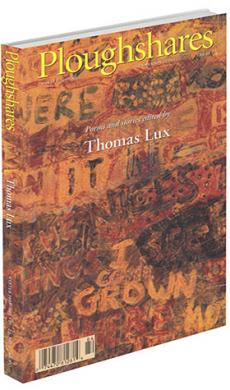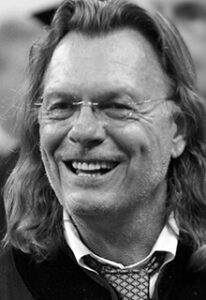rev. of Central Square by George Packer
Central Square
A novel by George Packer. Graywolf, $24.95 cloth. Reviewed by Don Lee.
There is a Cambridge, Massachusetts, with which few outsiders are familiar — the neighborhood that is the title of George Packer’s second novel, Central Square, which squats between posh Harvard and MIT, blighting the main avenue with “its discount shops, foreign restaurants, secondhand music stores, social services, hawkers and idlers and unstable energy.” As the neighborhood’s diversity is being threatened by gentrification, as liberalism falls to yuppiefication, three residents struggle to maintain a sense of community and, in the process, to save themselves.
Paula Vorhees works as a therapist in a basement counseling center that is quaintly called the Problem Place. More and more, she feels spent and trivial, “like a hooker hired by the hour to coax vices, hand out Kleenex, make the client feel that she cared for no one less in the world. . . . Many of them told her it helped them to talk to her — that they had no one else in the world to talk to. Today this thought saddened her beyond words.” She has problems of her own: an indifferent lover, an alcoholic mother, and the very real possibility that she’ll lose her job. Funding for the center is dwindling, and her boss can’t be bothered, preoccupied as he is with a nascent citizens group that bills itself as The Community — “a cross between a block watch, a nonviolent militia, and a twelve-step group.” But when she meets Eric Barnes by chance one wintry evening, she staves off the bleakness for a little while, commencing an affair with him, trying hard to ignore the fact that he is married.
What Paula doesn’t know is that Eric’s wife, Jane, is very pregnant, a development that looms over him with a crushing magnitude. A thirty-seven-year-old writer, he is trying to eke out his fourth novel but is stymied by money problems, not to mention his wife’s self-absorption. He asks his editor — a victim of mergers and acquisitions — for a bigger advance, and he is told that he will be lucky, with his paltry sales figures, to get his new book published at all. Eventually, he decides to discard his high-minded integrity and write an article for a slick magazine. “I’ve been an earnest little shithead, haven’t I?” he says to Jane. He plans to focus the article on Joe, a young African who is part of the crew renovating his house, and who has mysteriously become an icon for The Community.
As it turns out, Joe is not really African, but merely an African-American drifter, originally from San Francisco. After being fired from his job at Kinko’s, he had gone to Africa for a year to plant trees, yet fled back to the U.S. following a tribal slaughter. At the airport, and then again at a shelter called the Rainbow House, he is mistaken for an African national, and thereafter Joe happily allows rumors to flourish that he is a shaman, a healer, a magician, a shape-shifter. “He discovered that making things up was easier than telling the truth, which always felt like signing a confession. His new voice was deeper than the old one, and richer, and as he listened to its strange and wonderful sounds he began to think of a shy, elegant, skillful young African, full of promise.”
Events culminate at a rally sponsored by The Community. Joe reveals his deception, nearly causing a riot, and Paula faces the futility of her affair with Eric, by now “aware of a weak strain in his character, a dutifulness that tended toward fatalism; a self-fulfilling conviction that life was bound to disappoint. He was not hard enough. He was not one of the winners.” It is a brutal assessment, and
Central Square is a searing, trenchant elegy of the passion that once fueled the ideals of socialism, love, spirituality, racial harmony, class, and art — all attempts to commune with a larger purpose. The novel’s plot doesn’t quite meet its potential, but Packer writes with intelligence and honesty, and
Central Square stands not only as an evocation of a neighborhood, but also as an important survey of our culture.

